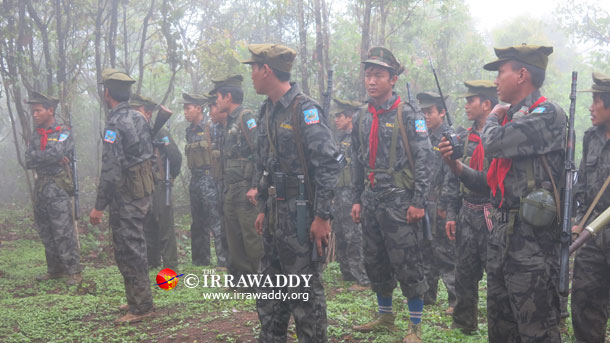RANGOON — The Ta’ang National Liberation Army (TNLA) says it launched two attacks on Burmese government forces on Wednesday in northern Shan State, killing at least 10 government soldiers.
Both attacks were in Namkham Township, which neighbors Kachin State as well as China.
“At 5:30 am, our troops attacked one of their battalions. We shot at them, but we do not know exactly how many casualties there were,” TNLA spokesman Mai Aie Kyaw told The Irrawaddy.
He said that at about 10:30 am, TNLA troops fired rocket-propelled grenades at two vehicles carrying government forces, leaving at least 10 soldiers dead and others wounded,
“We hit their cars with our RPG. One car flipped over on the road and was destroyed. Another caught on fire,” the TNLA spokesman said.
Fighting has been ongoing almost daily in Namkham Township, he said, citing 20 clashes this month. He said local civilians in some villages had fled their homes to avoid the conflict.
Mai Aie Kyaw said that no TNLA soldiers had died in recent clashes, but that one soldier was wounded on Sunday.
More troops from the government’s army have been deployed to northern Shan State and neighboring Kachin State over the past month, despite pledges by Naypyidaw to work toward a nationwide ceasefire accord and host peace talks with ethnic armed groups in Rangoon. About 2,000 government troops are now active in Namkham Township, according to reports from Ta’ang army leaders.
The TNLA and the Kachin Independence Army (KIA) are the only two major ethnic armed groups in the country that do not currently have individual ceasefire deals with the government’s army.
In KIA territory, waves of clashes that began earlier this month appear to be the most serious fighting since early last year. The clashes have left at least 22 soldiers dead, according to state media, while aid groups say 5,000 civilians have been forced to flee their homes. The newly displaced people join about 100,000 others who have fled due to the conflict since 2011.
About 1,000 children have been displaced over the past month in Man Win Gyi and Momauk townships of southern Kachin State, according to Unicef.
“The fighting and the associated displacement of families has increased the health risks that children face, including by reducing their access to safe, reliable water and sanitation facilities,” Bertrand Bainvel, the Unicef representative in Burma, said in a statement.
“It is an unfortunate fact that the heightened risk that children face does not disappear even after the fighting stops, because they face a significantly increased risk of falling victim to commonly used landmines and even to possible recruitment into the combatants’ armed forces.”

















